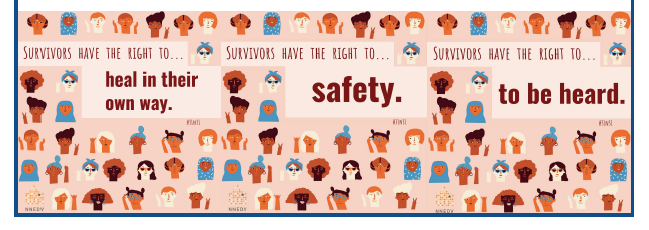By Emily Fanjoy, Health Programs Coordinator, Tides of Change
“Homes and families are supposed to be sacred territory, the ‘haven in a heartless world,’” wrote Rachel Louise Snyder, author of the newly released No Visible Bruises: What We Don’t Know About Domestic Violence can Kill Us. So—what happens when it’s not?
A 2018 study released by the United Nations Office on Drugs and Crime called home “the most dangerous place for women” as it cited that 50,000 women were killed by their partners and family members in 2017 alone, . This number does not include men, gender non-conforming and transgender people, or children who were murdered during that same period. It’s important to note that anyone can perpetrate violence and anyone can be a survivor of intimate partner or domestic violence. Still, 85% of all survivors are women and girls . Jaqueline Campbell, RN PhD, a national leader in research and advocacy in the field of intimate partner and domestic violence, notes that for every woman killed in the United States, 9 more are almost killed. The World Health Organization calls intimate partner violence “a global health problem of epidemic proportions.”
Most people, including many survivors, identify domestic violence as physical assault only, but it is so much more. Intimate partner, domestic, or teen dating violence (IPV) occur when one person in a relationship uses a pattern of methods and tactics to gain and maintain power and control over the other person. It’s a cycle that generally gets worse over time—not a one-time incident. People who choose abusive behavior use jealousy, isolation, emotional and psychological abuse, coercion, intimidation, and threats long before physical violence occurs. Leaving an abusive relationship is not always the best, safest, or most realistic option for survivors. All of us, whether we realize it or not, know people who have experienced or are living with intimate partner violence. Its impacts ripple out through our community and are felt by friends, family, employers, educators, healthcare providers, police officers, the court system, faith communities . . . and the list goes on. Because all of us are impacted by it, we can work together to support survivors and end violence in our community.
October is national Domestic Violence Awareness Month, and Tides of Change (formerly Tillamook Co. Women’s Resource Center) invites you to join us in honoring survivors and victims. The Tides of Change mission is to provide hope, safety, and support to those impacted by gender based violence and shift cultural norms through advocacy, education, and community collaboration. Tides of Change offers advocacy services, including assessment and safety planning; education and referrals to community resources, health services, and legal assistance; support groups; free counseling services; and emergency shelter and safe housing.
We could not do this alone. Everyone has a part to play in supporting survivors and ending domestic violence—educators and parents have the opportunity to talk about and model healthy relationships; health-care providers can discuss with patients how relationships affect health; faith communities can facilitate conversations about safety and respect within marriage and family life.
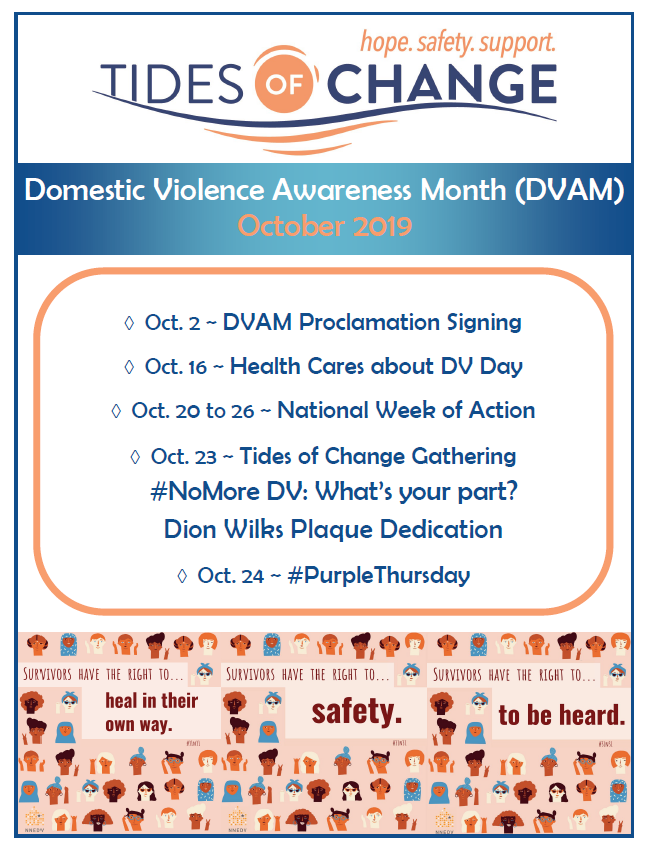
For Domestic Violence Awareness Month, this year we’re asking folks to answer the question, What’s your part? During October, there are many opportunities to find your part:
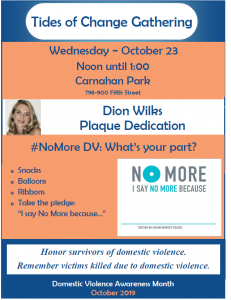
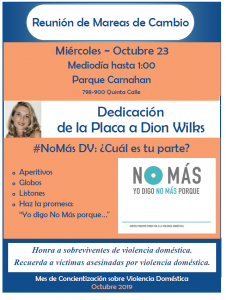
•On Wed., October 23, you are invited to gather with Tides of Change at Carnahan Park from noon to 1 pm. As usual, we will honor survivors and remember local individuals who were murdered by current or former partners. This year we will be dedicating a new plaque in memory of Tillamook native Dion Wilks. Dion was a Tillamook High School Grad, practicing dental hygienist, and National Guard soldier who was killed by a former boyfriend on February 1, 2003 outside of Salem. Attendees will be invited to take a #NoMore pledge and write their reasons for wanting to end domestic violence and the #1Thing they will do to support survivors. A photo booth will provide a place for people to take photos with their pledges and post them on social media.
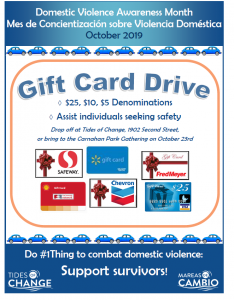
•Tides of Change is hosting a gift card drive throughout the month to support survivors directly. ToC staff and community partners work to meet needs of survivors and their children. Even so, survivors are sometimes without basic needs like money for gas or a way to pay for prescriptions. Gift cards in denominations of $25, $10, or $5 for local businesses like Shell, Chevron, Safeway, and Fred Meyer will support survivors as they seek safety.
•On October 24, participate in #PurpleThursday by wearing purple and posting your picture to Tides of Change social media accounts as an individual, group, or business.
oOn Facebook @Tidesofchangenw, on Instagram @tidesofchangenw, or Twitter @TidesofChangenw
•In October and throughout the year, invite Tides of Change to share more about our work or facilitate a training with your organization or business.
•All year long, support Tides of Change through a monthly donation.
As author Jeanne McElvaney wrote, “You can recognize survivors of abuse by their courage. When silence is so very inviting, they step forward and share their truth so other know they aren’t alone.”
Let’s stand with all survivors this month—and honor those we have lost—so that they know they are not alone. Let them know that everyone deserves healthy relationships and peaceful home, true havens from the challenges in this world. For more about services, go to www.tidesofchangenw.org.
SOURCES: https://www.bbc.com/news/world-46292919. See also: https://wwww-most-dangerous-place-for-women-with-majority-of-female-homicide-victims-worldwide-killed-by-partners-or-family-unodc-study-says.html
https://www.bjs.gov/content/pub/pdf/ipv01.pdf

